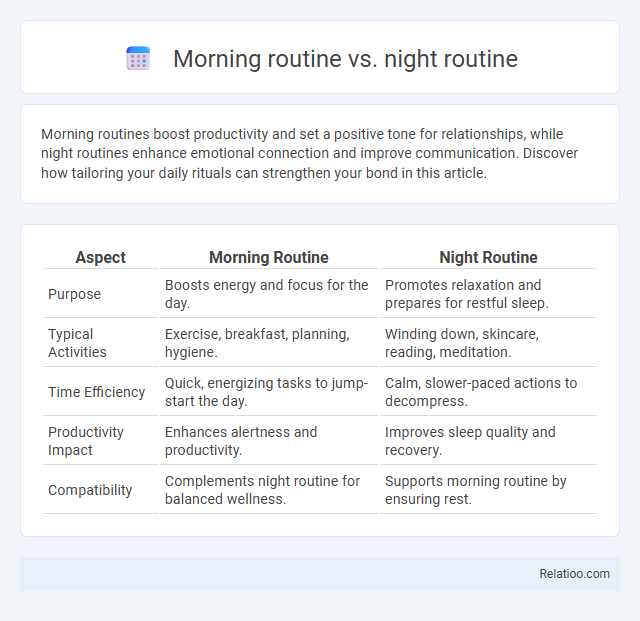Morning routines boost productivity and set a positive tone for relationships, while night routines enhance emotional connection and improve communication. Discover how tailoring your daily rituals can strengthen your bond in this article.
Table of Comparison
| Aspect | Morning Routine | Night Routine |
|---|---|---|
| Purpose | Boosts energy and focus for the day. | Promotes relaxation and prepares for restful sleep. |
| Typical Activities | Exercise, breakfast, planning, hygiene. | Winding down, skincare, reading, meditation. |
| Time Efficiency | Quick, energizing tasks to jump-start the day. | Calm, slower-paced actions to decompress. |
| Productivity Impact | Enhances alertness and productivity. | Improves sleep quality and recovery. |
| Compatibility | Complements night routine for balanced wellness. | Supports morning routine by ensuring rest. |
Defining Morning and Night Routines
Morning routines consist of activities performed upon waking, such as exercise, meditation, and planning, designed to boost energy and productivity for the day. Night routines involve winding-down habits like reading, journaling, or skincare, aimed at relaxation and preparing the body for restful sleep. Both types of routines create structure, promote mental well-being, and support consistent daily habits for overall health and efficiency.
Benefits of a Structured Morning Routine
A structured morning routine enhances productivity by setting a positive tone for the day, helping you prioritize tasks and manage time efficiently. It boosts mental clarity and energy levels, enabling better focus and decision-making throughout your daily activities. Consistently practicing a morning routine supports emotional well-being and reduces stress, laying a strong foundation for overall health and success.
Advantages of a Consistent Night Routine
A consistent night routine enhances sleep quality by regulating the body's circadian rhythm and promoting relaxation, leading to improved cognitive function and mood the following day. Unlike morning routines that boost productivity or general routines that organize daily tasks, a night routine specifically supports mental and physical recovery, reducing stress and preventing insomnia. Establishing habits such as dimming lights, limiting screen time, and practicing mindfulness before bed optimizes overall health and daytime performance.
Psychological Impact: Morning vs. Night Rituals
Morning routines stimulate cortisol production, boosting alertness and setting a positive tone for Your day, while night routines promote melatonin release, aiding relaxation and quality sleep. Establishing consistent rituals enhances mental clarity, emotional stability, and stress management by balancing circadian rhythms. Prioritizing either morning or night routines depends on individual psychological needs and lifestyle, influencing overall well-being and productivity.
Productivity Outcomes: Early Birds vs. Night Owls
Morning routines for early birds often enhance productivity by leveraging peak cognitive function and energy levels during the first hours after waking, resulting in improved focus and task completion. Night owls tend to experience optimized creativity and problem-solving skills during evening routines, aligning productivity outcomes with their natural circadian rhythms. Tailoring routines to individual chronotypes maximizes efficiency and sustains high performance throughout the day.
Morning Routine Ideas for a Productive Day
Morning routines set the tone for your entire day by boosting focus, energy, and productivity through activities like exercise, meditation, and goal setting. Incorporating habits such as journaling or a nutritious breakfast enhances mental clarity and motivation, distinguishing morning routines from night routines that prioritize relaxation and preparation for rest. Prioritizing your morning routine lays a solid foundation for achieving daily goals and maintaining overall well-being.
Night Routine Practices for Better Sleep
Night routine practices significantly improve sleep quality by promoting relaxation and signaling the body to prepare for rest. Key habits include limiting screen time an hour before bed, engaging in calming activities like reading or meditation, and maintaining a consistent sleep schedule. Incorporating these steps in your night routine can reduce insomnia, balance circadian rhythms, and enhance overall sleep efficiency.
Common Mistakes in Morning and Night Routines
Common mistakes in morning routines include hitting the snooze button repeatedly, which disrupts sleep cycles and reduces productivity, and skipping hydration or breakfast, leading to low energy levels. Night routine errors often involve excessive screen time before bed, delaying melatonin release and worsening sleep quality, and neglecting consistent sleep schedules, which impairs circadian rhythm regulation. Establishing intentional routines that prioritize hydration, regular sleep-wake times, and limited blue light exposure optimizes overall health and daily performance.
Customizing Routines for Individual Lifestyles
Customizing routines for individual lifestyles involves tailoring morning and night habits to match personal preferences and daily demands. Morning routines often emphasize energy-boosting activities like exercise and goal setting, while night routines focus on relaxation and preparing for restful sleep. A flexible approach that considers one's unique schedule, priorities, and biological rhythms enhances overall well-being and productivity.
Choosing the Best Routine for Your Goals
Selecting the best routine for your goals depends on aligning activities with your natural energy peaks; morning routines boost productivity and mental clarity through habits like exercise and planning, while night routines emphasize reflection and relaxation to improve sleep quality and reduce stress. Tailoring a routine--whether morning, night, or a balanced mix--requires understanding personal chronotypes and goal-specific demands, optimizing consistency for sustained success. Emphasizing goal-oriented tasks during peak performance periods maximizes efficiency, making the choice of routine crucial in achieving desired outcomes.

Infographic: Morning routine vs Night routine
 relatioo.com
relatioo.com